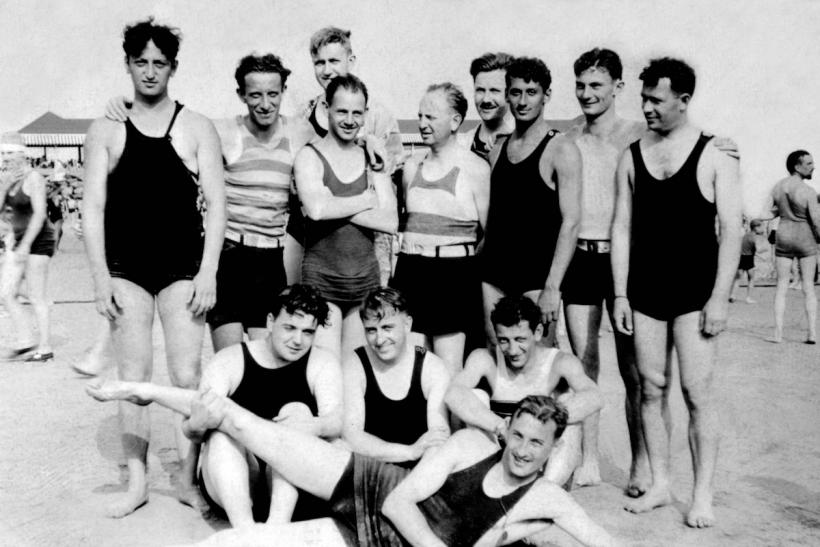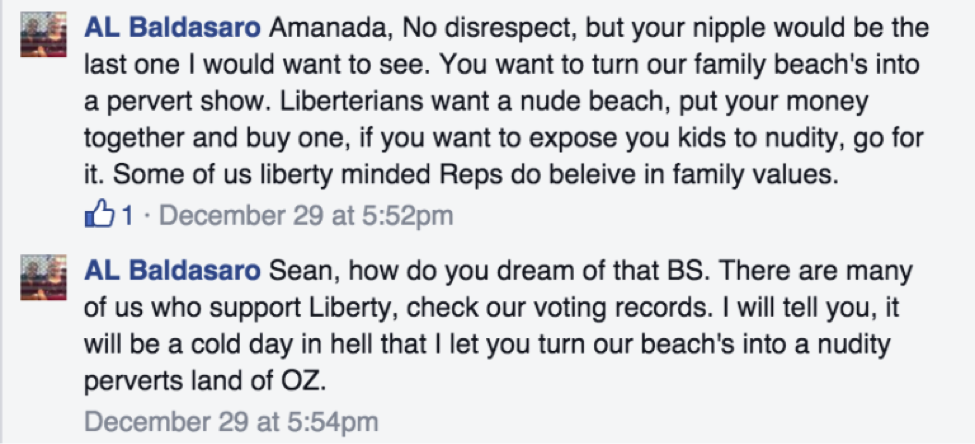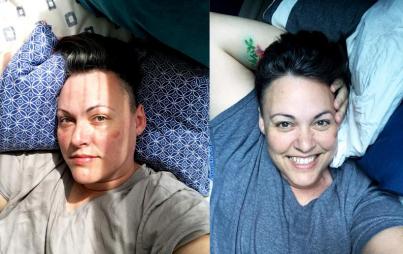
THEIR nipples were freed — why not mine? Image: Thinkstock.
The movement embodies the classic case of men getting to define “family values” and “natural” human behavior in society — a theme universal to just about every feminist struggle around the world.
It was at about this time last year that the Free the Nipple movement first gained steam, as people around the world responded to Lina Esco’s critically-acclaimed film of the same name by staging peaceful — and, of course, topless — protests.
On campuses and at beaches and parks, women and people with breasts took off their shirts in an effort to reclaim their bodies from sexual double standards and repressive cultural norms. With the weather heating up, and with more feminists fighting objectification of women's bodies and the stigma around public breastfeeding, Free the Nipple will doubtless soon emerge as a contentious issue yet again.
The movement hasn’t been popular with everyone.
But surprisingly, it's garnered criticism from feminists.
In the Guardian op-ed headlined “Scout Willis’s Topless Instagram Protest Draws More Eyeballs Than Action,” beloved progressive writer Jamie Peck criticized the movement as one lacking political substance. She concluded her analysis with the (good) point that while “there's nothing wrong with nipples... they're hardly the only entities that need freeing.”
After writing my first piece about Free the Nipple for Bustle, I was met with similar — albeit far more condescending — criticism on Twitter, such as the pair of conservatives who lambasted the movement as “fifth-wave feminist” nonsense and a “joke” overall.
As a whole, these responses to the movement are a pretty accurate representation of how Free the Nipple is perceived in society, either as a crass joke or the mark of privileged, “first-world” feminism.
Ultimately, there are two reasons that I’m still consistently moved to write about it even if it means disagreeing with individuals for whom I have nothing but respect.
The first is that, having been the object of sexual harassment for inadvertently supporting the movement not too long ago, it’s a very personal issue to me as the first feminist cause I could really relate to.
The second is that I simply disagree with the perspective that Free the Nipple lacks political substance or relevance to a feminist movement that has its hands full with abortion rights, sexual assault/victim-blaming, sex trafficking, the wage gap, and so on and so forth.
As dismissively as most people continue to treat Free the Nipple, the movement embodies the classic case of men getting to define “family values” and what constitutes natural human behavior in society, a theme universal to just about every feminist struggle around the world.
Supporting women’s autonomy over their bodies, right to make their own lifestyle choices, and opposing the idea that women who dress or behave in a certain way are “asking for it” (“it” being harassment or rape): Think about it and you’ll see how Free the Nipple works hand-in-hand with the pro-choice and anti-victim-blaming movements.
As dismissively as most people continue to treat Free the Nipple, the movement embodies the classic case of men getting to define “family values” and what constitutes “natural” human behavior in society — a theme universal to just about every feminist struggle around the world.
I can hardly think of a better example of this than an incident which unfolded over the past few months in New Hampshire. State representatives (all men) sponsored House Bill (HB) 1525 in an attempt to ban public nipple exposure.
Only women's nipples, though.
“This is about a movement to change the values of New Hampshire society,” Rep. Brian Gallagher (R-Belknap), author of the proposed HB 1525, said at a public hearing in February. Gallagher and other predominantly male representatives defined female nipple exposure as a threat to family values and part of an imagined “nudity problem” — in a state with temperatures averaging just 46 degrees.
However, the policy made no objections to women's nipple exposure in pornography or other sexualized images meant for the male gaze.
In this sense, rather than banning women's nipples, the bill banned women from making choices about their own bodies.
But just last month, HB 1525 was successfully killed by the House Criminal Justice and Public Safety Committee in a decisive 18-0 sweep, arguably in large part due to the efforts of Amanda Bouldin, a young Democrat representative whose opposition of the bill went viral.
Does it get any more classic than bodily autonomy for women being put in the context of sexual perversion and corruption of the youth?
The same male representatives who supported the bill didn’t hold back from confronting Bouldin on social media. One, Rep. Josh Moore, commented on Bouldin’s Facebook post decrying the bill: “If it's a woman's natural inclination to put her nipple out in public and you support that, then you should have no problem with a man's inclination to stare at it and grab it. After all…it's ALL relative and natural, right?”
Because, of course, “natural” behaviors like breastfeeding one’s child or going for a peaceful, topless stroll like so many men do everyday call for the equally “natural” behaviors of molestation and harassment.
Moore continued by assuring us all that, gallant feminist he is, of course he has “respect for a women [sic] and her innocence and decency,” — as long as those women don't have the nerve to ask for the right to help decide what constitutes “innocence” and “decency!”


Another, Rep. Al Baldasaro, commented: “Amanda, no disrespect, but your nipple would be the last one I would want to see. You want to turn our family beaches into a pervert show.”
Ah, does it get any more classic than denying women bodily autonomy by accusing them of sexual perversion and corrupting children?

“I'm pretty shocked that something's being proposed in 2016 that starts with ʻwomen should not,ʼ” Bouldin told the New York Daily News back in December. “The biggest rage I felt was when I found out about the bill. Just reading it makes my blood boil.”
The unfortunate truth is that HB1525 and the storm of controversy it inspired hardly constitute an isolated incident. Just look at Springfield, MO., where topless protests sparked new, restrictive city ordinances, and, in response, an ACLU lawsuit.
I caught up with Amanda Bouldin through a Skype call to discuss her experiences fighting the “nipple ban,” as well as her unique take on the controversial movement that she's been crowned champion of by Internet supporters.
Cheung: How often, if ever, have you encountered misogyny as a state representative of New Hampshire?
Boudin: If it happens at all, I don’t notice it too much. In a state like New Hampshire — where there’s more women in politics than most states, where a lot of women have found success in politics [Jeanne Shaheen and Kelly Ayotte, to name a few] and we’re electing female governors — it’s a supportive environment.
And in terms of voter base, women are supportive of women. I like to think that when these men sponsored this “nipple ban,” they had no idea what they were up against.
The people promoting this legislation were doing so on the basis that women needed to be protected from harassment and assault, and the way to protect them was to force them to wear clothes, as if a topless woman will automatically be harassed and we just need to accept this.
C: What was it about the “nipple ban” that prompted you to take action?
B: The fact that it applied only to women is what got me going. And New Hampshire is pretty cold; we don't have a nudity problem in the first place.
I hate bad government, like when they produce laws that fail to do their job. The War on Drugs is a big example of this — a complete failure that just leads to mass incarceration and doesn't accomplish what they intend[ed].
And even from a conservative standpoint, not considering gender or anything, the law is ineffective, because it’s meant to prevent this behavior. But if women wanted to protest it by going topless, civil disobedience is protected by freedom of speech. It wouldn’t achieve its goal anyway.
And other things — it doesn’t consider transgender people, doesn’t apply equally to both genders, it’s just really shortsighted and stupid.
And as a whole, I noticed that the people promoting this legislation were doing so on the basis that women needed to be protected from harassment and assault, and the way to protect them was to force them to wear clothes — as if a topless woman will automatically be harassed and we just need to accept this.
Like, we'll give her a ticket, eventually arrest her, and put her in jail, but at what point do you hold the actual person who committed assault responsible?
It’s the same mentality if a woman is raped: “What was she wearing, who was she flirting with, was she drunk?” It’s all rooted in victim-blaming.
They think they're saving women from assault by forcing them to wear clothes, which might be advisable. But more often than not, I'm sure statistically, women who are raped are mostly women with clothes on.
[A critic] repeatedly claim[ed] the only reason I opposed the bill was that I wanted to expose myself to people, as if there weren’t a thousand legitimate reasons to oppose it.
C: Overall, how would you describe the response to your campaigning against the bill?
B: Aside from the comments — and by the way, Josh and Al really are nice, polite people in real life — I got an overwhelming amount of support.
Of course, there were some pretty gendered comments, like Al saying, “Your nipple would be the last one I’d want to see.”
But it was mostly his wife, who would just repeatedly claim the only reason I opposed the bill was that I wanted to expose myself to people — as if there weren’t a thousand [other] legitimate reasons to oppose it.
C: Do you think the response would have differed if you were a man?
B: I guess I wouldn’t really be accused of wanting to expose myself, or told my nipple was the last one Al would want to see, but I think the response would be critical too.
I’d probably be accused of being a pervert who just wants to see women’s nipples.
It’s a hard subject in general, because they’re just going to make assumptions that support their side.
C: What next steps are being taken by New Hampshire representatives, now that HB1525 is dead for the time being?
B: Now there’s an even stupider bill, Senate Bill 347, which basically says states and local governments can make laws regulating what people wear. It’s so repressive, there’s no lines — you could say people can’t wear political T-shirts, or gang colors, or LGBT expressions.
And it’s clearly aimed as a follow-up to HB1525, and you know this because the bill claims it’s not meant to prohibit breastfeeding.
It’s just a classic example of how these are the people who claim to oppose big government — but what do they call this? The public hearing for it was just last week on Tuesday (Apr. 19) and there’s an upcoming executive hearing session on Tuesday (Apr. 26)... I’m hopeful we’ll take it down.
Activism, regardless of what you’re working on, is difficult. But if you're doing it right, it's supposed to enlighten people, not upset them.
C: Do you think the Free the Nipple movement deserves to be taken more seriously in society, and if so, why?
B: I’m not really connected with the movement as a whole, but it doesn’t bother me at all. If I saw Free the Nipple protesters at the beach, and I was with my 9-year-old daughter, I don’t know, maybe we’d go talk to them. I think it’s an important conversation to have with your children.
But as a whole, I think you get the respect that you earn. Activism, regardless of what you’re working on, is difficult. But if you're doing it right, it's supposed to enlighten people, not upset them.
Free the Nipple protesters are fighting a sexist cultural norm, but I think activism should take you closer to your goal if you’re doing it right, so if your activism is actually getting legislators to write bills against you, maybe you could stand to rethink your approach a bit.
So I think Free the Nipple is still in the process of earning that respect, and we’re lucky we have forward-thinking legislators in New Hampshire who can recognize there’s way more important things to discuss than little bits of dark flesh on the body.
Screenshots courtesy of Amanda Bouldin.







